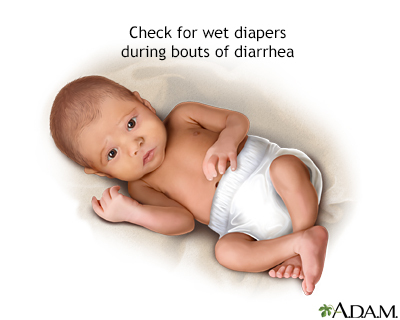When you have diarrhea
Description
Diarrhea is the passage of loose or watery stool. For some, diarrhea is mild and will go away within a few days. For others, it may last longer. It can make you lose too much fluid (dehydrated) and feel weak. It can also lead to unhealthy weight loss.
The stomach flu is a common cause of diarrhea. Medical treatments, such as antibiotics and some cancer treatments can also cause diarrhea.
Patient Education Video: Diarrhea
Test Your Knowledge About Diarrhea in Kids
Alternative Names
Diarrhea - self-care; Diarrhea - gastroenteritis
How to Relieve Diarrhea
These things may help you feel better if you have diarrhea:
- Drink 8 to 10 glasses of clear fluids every day. Water is best.
- Drink at least 1 cup (240 milliliters) of liquid every time you have a loose bowel movement.
- Eat small meals throughout the day, instead of 3 big meals.
- Eat some salty foods, such as pretzels, soup, and sports drinks.
- Eat some high potassium foods, such as bananas, potatoes without the skin, and fruit juices.
Ask your health care provider if you should take a multivitamin or drink sports drinks to boost your nutrition. Also ask about taking a fiber supplement, such as Metamucil, to add bulk to your stools.
Your provider may also recommend a special medicine for diarrhea. Take this medicine as you have been told to take it.
Eating When you Have Diarrhea
You can bake or broil beef, pork, chicken, fish, or turkey. Cooked eggs are also OK. Use low-fat milk, cheese, or yogurt.
If you have very severe diarrhea, you may need to stop eating or drinking dairy products for a few days.
Eat bread products made from refined, white flour. Pasta, white rice, and cereals such as cream of wheat, farina, oatmeal, and cornflakes are OK. You may also try pancakes and waffles made with white flour, and cornbread. But don't add too much honey or syrup.
You should eat vegetables, including carrots, green beans, mushrooms, beets, asparagus tips, acorn squash, and peeled zucchini. Cook them first. Baked potatoes are OK. In general, removing seeds and skins is best.
You can include desserts and snacks such as fruit-flavored gelatin, fruit-flavored ice pops, cakes, cookies, or sherbet.
Things you Should Avoid Eating or Drinking
You should avoid certain kinds of foods when you have diarrhea, including fried foods and greasy foods.
Avoid fruits and vegetables that can cause gas, such as broccoli, peppers, beans, peas, berries, prunes, chickpeas, green leafy vegetables, and corn.
Avoid caffeine, alcohol, and carbonated drinks.
Limit or cut out milk and other dairy products if they are making your diarrhea worse or causing gas and bloating.
When to Call the Doctor
Contact your provider if you have:
- The diarrhea gets worse or does not get better in 2 days for an infant or child, or 5 days for adults
- Stools with an unusual odor or color
- Nausea or vomiting
- Blood or mucus in your stool
- A fever that does not go away
- Stomach pain
Gallery

References
Bartelt LA, Guerrant RL. Diarrhea with little or no fever. In: Bennett JE, Dolin R, Blaser MJ, eds. Mandell, Douglas, and Bennett's Principles and Practice of Infectious Diseases. 9th ed. Philadelphia, PA: Elsevier; 2020:chap 98.
Schiller LR, Sellin JH. Diarrhea. In: Feldman M, Friedman LS, Brandt LJ, eds. Sleisenger and Fordtran's Gastrointestinal and Liver Disease. 11th ed. Philadelphia, PA: Elsevier; 2021:chap 16.